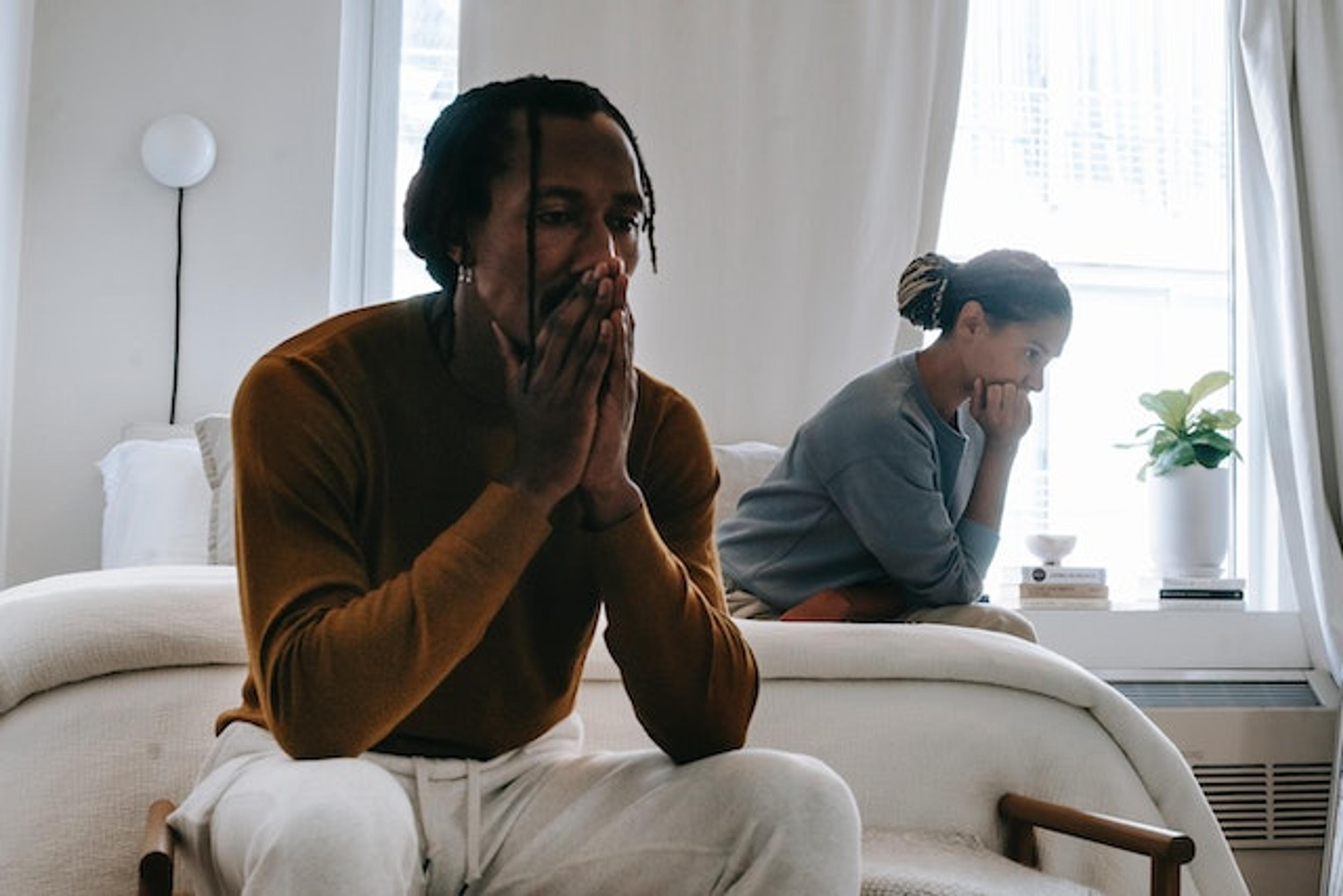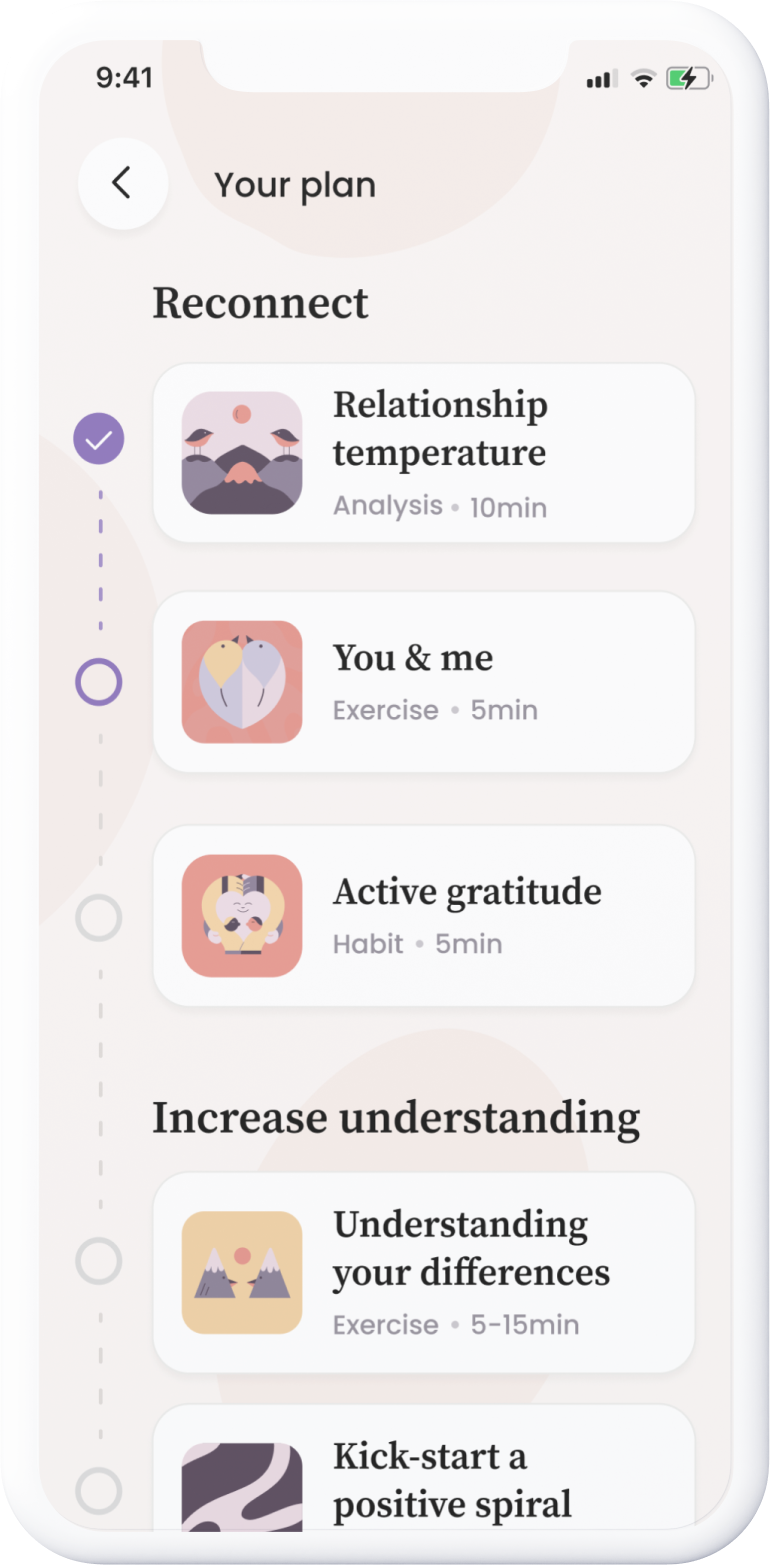10 Common Relationship Problems
Learn more about some common relationship problems and how to overcome them- 18 April 2024
- 7min

If you are experiencing relationship problems, you are not alone. Living together can be challenging, and no relationship is smooth sailing all the time. Problems can arise in all relationships, and studies show that one in three couples struggle in their relationship. Relationship issues can contribute to a negative atmosphere, conflicts, and decreased intimacy in the relationship. However, there is help available, and there are things you can do on your own to overcome relationship problems!
What are relationship problems?
Relationship problems refer to experiencing some type of issue in your relationship. It can range from minor misunderstandings and different opinions to larger conflicts and betrayals. The experience of relationship problems can also be more vague, such as feeling a cold atmosphere between you or having an irritated tone towards each other.
10 common relationship problems
- Less joy in the relationship: not appreciating, enjoying, or having fun together anymore.
- Repeated arguments or conflicts that lead to fights or a negative atmosphere.
- Not feeling understood or seen by your partner, often resulting in feeling lonely in the relationship.
- Misunderstandings in communication, such as difficulty talking about problems in a constructive way and negative interpretations of each other.
- Feeling a lack of closeness in the relationship.
- Differences in personality and needs that impact the relationship negatively, such as different needs for structure/planning.
- Lack of trust in each other, sometimes related to infidelity or other type of betrayal.
- Not prioritizing the relationship or each other enough.
- Problems with the sex life, such as lack of desire or differing views on how often to have sex.
- Jealousy. Being jealous yourself, or having a jealous partner has a negative impact on a relationship.
Relationship problems affect your well-being
During periods when the relationship is characterised by problems, your own well-being is often negatively affected, as relationships are important to us. Others around us, such as our children, can also be negatively impacted when parents are struggling in their relationship.
Therefore, it is important to recognize and address relationship problems early on, before they become big and the distance between you grows.
When is it time to seek help?
As psychologists, we often meet couples who have waited a long time to seek help for their relationship problems, and by then, the problems have become very big. There are many reasons why couples hesitate to seek help. One reason may be that one person in the relationship is more proactive in seeking help, while the other may not see the same need or find therapy intimidating. Practical obstacles, such as difficulties in finding time during the day to attend therapy together, can also be barriers from seeking help in time. Economics can also be a barrier, seeking private couples therapy can quickly become costly.
So, when is it time to seek help? If you feel that the problems are increasing over time and despite attempts to solve them on your own, you are stuck in the same patterns, that can be an indication. When one or both of you feel that the relationship is taking more energy than it is giving, or if one of you is struggling in the relationship, we recommend seeking help.
Some couples seek couples therapy as a last resort, when they are close to separation. Sometimes, couples therapy can even aim to facilitate a healthy separation with continued cooperation, for example, concerning shared children. However, ideally, we would like to see more people trying to address relationship problems much earlier!
Help with relationship problems
Common goals when seeking to resolve relationship problems often include increasing understanding of each other and deepening the feeling of warmth and closeness in the relationship. It can involve learning more about and finding ways to manage differences in personality and needs. An important part is finding better ways to communicate to reduce misunderstandings and conflicts. It also involves increasing loving actions in the relationship and creating increased physical and emotional closeness.
You can also work on your relationship issues on your own. This can be a good option before the problems become too big. Working preventively is a way to prevent problems from growing bigger. The app Ally is a completely new form of preventive couples therapy developed by licensed psychologists with extensive experience in couples therapy.
To solve relationship problems on your own
Most relationship problems can be worked on! Often, you can make significant progress on your own. Here are some tips on what you can do to work on your relationship problems:
1. Reflect on what you miss or long for in your relationship
Start from how your relationship looks today and write down what you perceive as problematic right now. How does it compare to earlier in your relationship? What do you long for? Has anything happened in your lives that you think has contributed to where you are today? The first step is to concretize this for yourself.
2. Share with your partner
Find a good opportunity to tell your partner about your experience. Try to express yourself based on what you miss or long for, rather than what your partner does or doesn't do. For example, say "I get so upset when we argue, I would like to find a better way to communicate when we disagree" instead of "You always get so angry, it's impossible to talk to you!"
3. Listen to your partner's experience
Try to listen actively and without arguing when you have different perspectives. If your partner has a different experience, focus on understanding it instead of trying to convince or repeat your own opinion.
4. Find a way forward together
After listening to each other's experiences, you may be able to move forward. It may involve making changes based on the areas you perceive as problematic, or choosing the next step, such as seeking more help to solve relationship problems. Or you may not find a common path, in which case the next point is most relevant to you.
5. Start with yourself
You may get stuck at or after step 3. Do you have different perceptions of how the relationship functions or how to solve problems? Then it can be difficult to move forward in the way you desire. The fact is that you cannot change your partner, no matter how much you wish you could. The only person you can change is yourself, and it's important to take responsibility for yourself in this situation. What do you need to feel better? If you perceive the relationship problems as significant and do not see a common way forward, an answer to that question may also be to leave the relationship.
6. Get more guidance from the app Ally
If you and your partner do not want to see a third party and prefer to work on your own, our app Ally can be an option. You can use Ally together, or you can use the app on your own. In the app, you will be recommended exercises, articles, and podcasts to strengthen your relationship. All content is developed by licensed psychologists with extensive experience in couples therapy.
A first step can be to better understand any relationship problems by doing the Relationship Status in Ally. You answer questions about how you perceive different areas of your relationship right now and then receive a personal relationship analysis. The status provides a good overview of your strengths and challenges as a couple, a good starting point for further work on your relationship.








